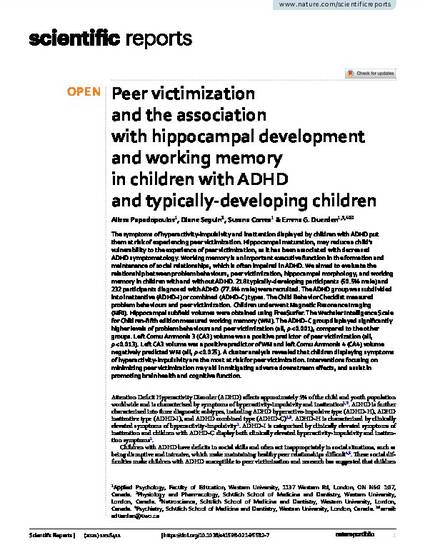
The symptoms of hyperactivity-impulsivity and inattention displayed by children with ADHD put them at risk of experiencing peer victimization. Hippocampal maturation, may reduce a child’s vulnerability to the experience of peer victimization, as it has been associated with decreased ADHD symptomatology. Working memory is an important executive function in the formation and maintenance of social relationships, which is often impaired in ADHD. We aimed to evaluate the relationship between problem behaviours, peer victimization, hippocampal morphology, and working memory in children with and without ADHD. 218 typically-developing participants (50.5% male) and 232 participants diagnosed with ADHD (77.6% male) were recruited. The ADHD group was subdivided into inattentive (ADHD-I) or combined (ADHD-C) types. The Child Behavior Checklist measured problem behaviours and peer victimization. Children underwent Magnetic Resonance Imaging (MRI). Hippocampal subfield volumes were obtained using FreeSurfer. The Wechsler Intelligence Scale for Children-fifth edition measured working memory (WM). The ADHD-C group displayed significantly higher levels of problem behaviours and peer victimization (all, p < 0.001), compared to the other groups. Left Cornu Ammonis 3 (CA3) volume was a positive predictor of peer victimization (all, p < 0.013). Left CA3 volume was a positive predictor of WM and left Cornu Ammonis 4 (CA4) volume negatively predicted WM (all, p < 0.025). A cluster analysis revealed that children displaying symptoms of hyperactivity-impulsivity are the most at risk for peer victimization. Interventions focusing on minimizing peer victimization may aid in mitigating adverse downstream effects, and assist in promoting brain health and cognitive function.
Available at: http://works.bepress.com/emma-duerden/23/
